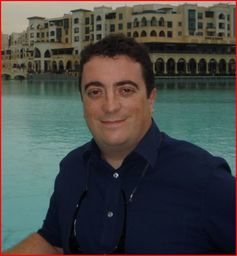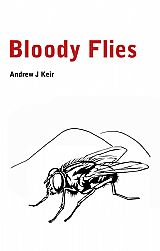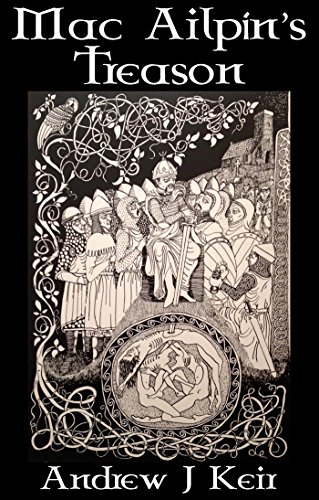NOVELIST & SHORT STORY WRITER ANDREW J. KEIR TO BOOKFABULOUS: 'ASPIRING WRITERS DON'T READ ENOUGH'21/11/2016 by Rana Asfour Andrew J. Keir is a name you can be sure will always pop up when writing and books are being discussed in the UAE. The novelist and short story writer who divides his time between Abu Dhabi and Scotland has managed since 2008 to publish two novels - 'Bloody Flies' (2012) and recently 'Mac Ailpin's Treason' - in addition to setting up and teaching a creative writing class popular with Abu Dhabi's aspiring writers. He was the first writer to be shortlisted twice for the Kitab/M Magazine short story prize, the largest prize in the Middle East for short stories in the English language - (The Sirens' Song and Moving Messages). His story Moving Messages was runner up in the 2010 competition. The Abu Dhabi based author holds an MA from Lancaster University's prestigious Creative Writing programme. His second novel, Mac Ailpin's Treason, is out now, and he is working on a picture book for children. His first novel, Bloody Flies, is out in paperback and ebook. BookFabulous: Thank you for agreeing to the interview. Tell us a little about yourself and how you got into writing? Andrew J. Keir: I am the married father of twin boys, who lives for most of the year in Abu Dhabi, and summers in Largs in Scotland. Since I was small I have always wanted to be an author and dabbled with writing. In 2008 I decided I had to do something more serious about this ambition and signed up for an undergraduate level creative writing course with the Open University. I loved it and before the year was out had published my first short story, 'The Sirens’ Song', in The National. After that, I submitted a portfolio of work to Lancaster University and, to my surprise, was accepted on to their MA in Creative Writing. My first novel, 'Bloody Flies' was the result of my time there. Since my graduation from that course, I have divided my time between writing and teaching Creative Writing. My second novel, 'Mac Ailpin’s Treason', came out this year. BF: What is the one thing that not many people know about you? AJK: I was once a stooge in the Ken Dodd laughter show. BF: How would you describe you first book ‘Bloody Flies’? AJK: 'Bloody Flies' is an episodic novel of interconnected short stories that are set in the UAE between 2000 and 2010. Each episode provides a perspective on the derailing expat life of the key protagonist, Leo Hunter, and his family. One of the themes of the book is slavery and this proved to be a bit controversial when it was released. BF: Although a work of fiction, ‘Bloody Flies’ does in fact touch upon many situations that expats in the UAE will identify with –some good, others not so – Did that mirroring of reality cause any difficulty where the editing process was concerned (i.e the decision to include or exclude certain scenes)? AJK: Yes. At times it was difficult to balance a truthful telling of my UAE stories with what might be accepted by others. I think a writer often, but not necessarily always, has a responsibility to self-censor at the editing stages if he/she wants to find an audience. In this case I realised that if I wanted to sell any copies in the UAE I would have to be careful and present certain scenes more delicately than I otherwise might have. In the end, I didn’t cut scenes but I did adjust them. That said, 'Bloody Flies' still caused a degree of consternation amongst certain groups on its release, and I think that was because I didn’t sacrifice the truth at the heart of the novel. 'Tell me Leo, why are you here?' His voice is soft. BF: Your second novel is also based on real events, is it not? AJK: 'Mac Ailpin’s Treason' is a historical adventure that tells the story of Cinaed Mac Ailpin and how he became the first King of Scotland. It is set in the ninth century and deals with Cinaed’s relationships and motivations that spurred him along in his dramatic and sometimes dark and violent life. Readers who enjoy a good story will enjoy the novel just as much as the history buffs out there. BF: As far as historical fiction writing goes, how much artistic license do you think writers should allow themselves and how do you perceive the ethics of writing about historical figures? AJK: I think that writers of historical fiction, especially medieval historical fiction, can never truly know the real historical figures that they write about. I think that this is also true of academic historians. In both cases the actuality of history is too far removed from modern life. However, writers can truly know the historical characters they have created, and if they have completed an appropriate amount of research that does justice to the writer’s subject, then the resultant work will contain inherent truths that make reading it worthwhile. On the beach, men are picking up the last of the Gael bodies and moving them to graves on unused land next to the farmstead. The Viking dead and their weapons still litter the sand. BF: Did publishing your first book change your writing process at all and if so, how did that manifest itself in your approach to your second novel? AJK: I had begun 'Bloody Flies' with a few short story ideas but no real plan and, about half way through, I realised I was getting a bit lost. I stopped what I was doing and drew up a plan to pull all the strings together. Thankfully it worked, but I realised then that I would draw up skeleton plans of future books before I started writing them. This is what I did for 'Mac Ailpin’s Treason'. The plan was not greatly detailed and allowed room for creative development - For example, my original plan outlined twenty-two chapters, but in the end the book was thirty-five chapters long - but was strong enough to keep me on my path. BF: How much research do you go into before writing a book? AJK: It depends on the genre of the novel and what the novel is about. For Bloody Flies I did very little research – just living in the UAE was good enough. Mac Ailpin’s Treason, on the other hand, involved a huge amount of detailed historical and literary research. This detective work was something I enjoyed very much and would like to do more of in future. BF: What do you find is the most difficult part in a creative process? And what have you learnt from overcoming the ones you have experienced while writing? AJK: Getting started every day. I am easily distracted and I find the daily discipline of writing difficult to stick to. The best solution is to draw up a strict weekly writing schedule and stick to it. Graham Greene wrote five hundred words a day and I aspire to that when I am in full flow. BF: How long on average does it take you to write a book? AJK: Between a year and two years. Teaching and child-care slows the process down considerably. BF: From your experience in teaching creative what are common traps that aspiring writers fall into and what advice can you offer from your journey so far? AJK: Most of your friends will say they love your work and won’t criticise you. Don’t believe them. Join a writers' group and you will receive more honest feedback. Criticism is good as it helps you to develop. Know and understand the genre that you are writing in. This will help you when you try to publish after the novel is written. Read more; Many aspiring writers don’t read enough. BF: What is your favourite childhood book? AJK: 'Charlie and the Chocolate Factory' by Roald Dahl – Fantastic escapism that proves the truism that books are always much better than their resultant movies. I still have vivid memories of my dad reading it to me. BF: Which in your opinion do you find to be an under-appreciated novel? AJK: 'Siddartha' by Hermann Hesse – Simple, beautiful and brilliant. BF: What book(s) are you reading at the moment? AJK: 'Shift' by Hugh Howey; This Sci-fi thriller is the second book in the Wool series, clever and entertaining, if a little long-winded. After that, I am looking forward to reading Ian Rankin’s new Inspector Rebus novel, 'Rather the Devil'. John Rebus is my favourite character in fiction. He ages in real time, with each book, and his development is intriguing.
1 Comment
|




 RSS Feed
RSS Feed
